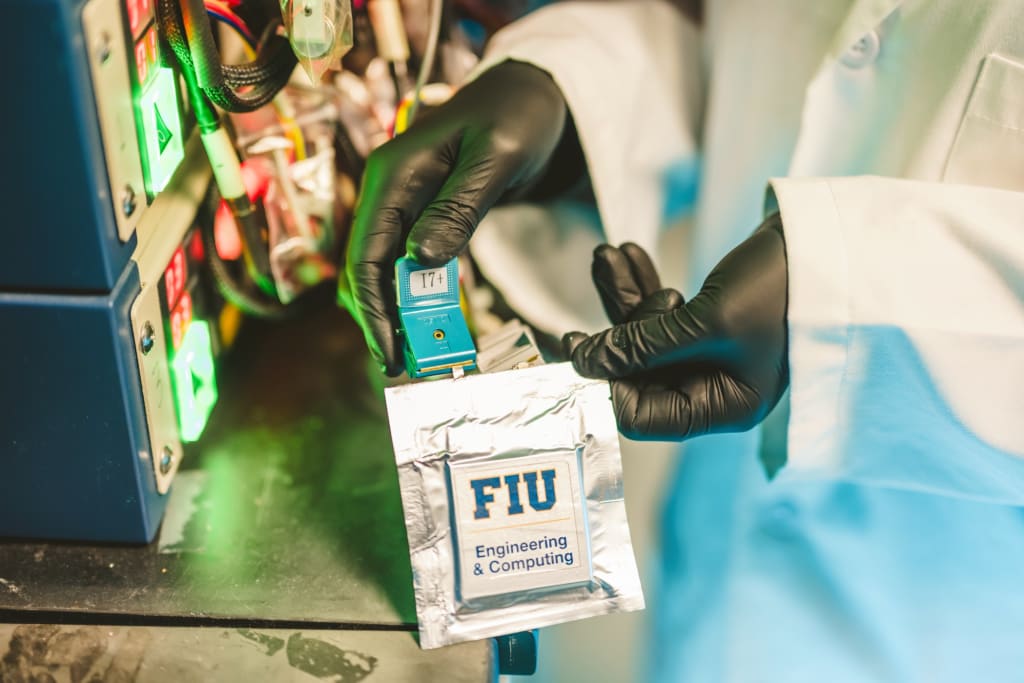More electric vehicles are on the road than ever before.
But a recent global survey found some EV owners — about 46% in the U.S. — have considered switching back to a gasoline car. The top reason: charging. While average ranges have steadily increased over time, drivers’ expectations still outpace what current lithium-ion batteries can deliver.
Now, Florida International University researchers have made a breakthrough with a next generation battery technology, known as beyond lithium-ion, that could one day make owning an EV a lot more convenient.
“We started working with these next generation battery chemistries eight years ago. The first charging cycle was great. By cycle 20, it was a useless lump of metal,” said Bilal El-Zahab, an associate professor in the FIU College of Engineering & Computing. “We had to become battery whisperers to solve the problems with them, so it’s really exciting to be at this stage.”
El-Zahab and his group at the FIU Battery Research Lab focused on lithium-sulfur, a beyond lithium-ion technology and one of the most promising alternatives to lithium-ion.
It’s both lightweight, less expensive and incredibly energy dense (meaning more charge can be carried). That allows EVs to go farther and laptops, smart phones and other devices to run for twice as long.

The downside: The lithium-sulfur chemistry that makes the battery last so long ultimately undermines the battery’s longevity, rendering it useless after 50 or so complete charges.
After years of testing, El-Zahab’s team discovered a solution to lengthen the lifespan of lithium-sulfur. All it took was introducing a little metal into the mix. Platinum stabilizes battery performance and boosts storage capacity closer to commercial viability. The results of their research were recently published in Energy and Environmental Materials.
“We achieved a 92% retention after 500 charging cycles, which means the battery is nearly as good as new,” said Aqsa Nazir, an FIU postdoctoral researcher in El-Zahab’s lab and first author of the study. “It also shows we minimized the negative reactions that hurt overall performance to bring this battery to the commercial level.”
All batteries function in a fairly straightforward manner: Ions move from one side of the battery to the other, back and forth, depending on whether it’s charging or releasing energy.
However, this process is a bit messier with lithium-sulfur.
One side of the battery is made of lithium, the other is made of sulfur.
When ions of lithium carrying charge reach the sulfur side, a chemical reaction occurs between the lithium and sulfur, resulting in the formation of lithium-containing sulfur compounds, called polysulfides, that are then carried to the lithium side during charging.
Over time, this causes a mossy build-up on the lithium side, which reduces energy efficiency and leads to the battery’s eventual deterioration.
To counteract this damaging chemical reaction, researchers added tiny nanoparticles of platinum to the sulfur side of the battery. Just as safety officers directs traffic to prevent accidents or backups, the platinum works at the molecular level to guide the lithium, ensuring it keeps flowing smoothly.
Only a miniscule amount — about 0.02% of the total battery — was needed to make a difference.
“Adding nanoparticles of platinum to the battery is like adding a pinch of salt to food: A small amount can have an outsized impact,” said El-Zahab.
El-Zahab’s lithium-sulfur battery is currently undergoing third-party testing — a critical step before it leaves the lab for licensing and commercialization.
This piece was originally published at https://news.fiu.edu/2025/electric-vehicles-could-travel-farther-on-a-single-charge-thanks-to-new-discovery. Banner image: Bilal El-Zahab and postdoctoral scientist Aqsa Nazir in the FIU Battery Research Laboratory. (Credit: Margi Rentis/FIU).
Sign up for The Invading Sea newsletter by visiting here. To support The Invading Sea, click here to make a donation. If you are interested in submitting an opinion piece to The Invading Sea, email Editor Nathan Crabbe at nc*****@*au.edu.



